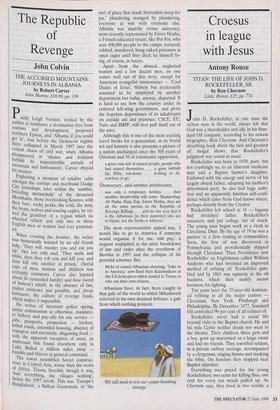The Republic of Revenge
John Colvin
THE ACCURSED MOUNTAINS: JOURNEYS IN ALBANIA by Robert Carver John Murray, Z18.99, pp. 339 Paddy Leigh Ferrnor, invited by the author to nominate a destination free from tourism and development, proposed northern Epirus, and 'Albania if you could get in'. Just before the Democrat regime there collapsed in March 1997 into the violent chaos of civil war, when Albania disappeared in 'silence and isolation behind its impenetrable curtain of mountain and lawlessness', Carver obeyed
his mentor.
Exploiting a moment of relative calm amongst the corrupt and moribund Dodge City townships, later within the 'sombre, brooding melancholy' of the Accursed Mountains, those overlooking Kosovo, with their bare, rocky peaks, the cold, the mist, the bears, wolves and soaring eagles, he vis- ited the grandeur of a region which no wheeled vehicle and only two or three English men or women had ever penetrat- ed.
When crossing the frontier, the writer was hysterically warned by an old Greek lady, 'They will murder you and eat you up.' Her son only said, 'They smile and smile, then they rob you and kill you; and then kill one another in prison.' (Serial rape of men, women and children was certainly common). Carver also learned about fis (extended family) and besa (word of honour) which, in the absence of law, makes existence just possible, and about hakmarre, the culture of revenge feuds, which makes it impossible. He writes of incessant police spying, under communism or otherwise, mandato- ry bribery and pay-offs for any service — jobs, passports, promotion — broken, lethal roads, untended housing, absence of transport and electricity, disgusting food with the apparent exception of omul, an ambrosial fish found elsewhere only in Lake Baikal a million miles away bandits and thieves in general command.
The towns resembled Soviet construc- tions in Central Asia, worse than the worst of Africa. Tirana, horrible though it was, `had everything, the villages nothing', hence the 1997 revolt. This was 'Europe's Bangladesh', a Balkan Guatemala, or 'the
sort of place that made Surrealists weep for joy,' plundering avenged by plundering, everyone at war with everyone else. Albania was anarchy versus autocracy, most recently represented by Enver Hoxha, a French-educated tyrant, like Pol Pot, who sent 400,000 people to the camps, tortured, robbed, murdered, hung naked prisoners in open cages until they died; he himself liv- ing, of course, in luxury.
Apart from the abused, neglected women and a few decent men, no one comes well out of this story, except for American evangelist missionaries — 'Cool Dudes of Jesus', blithely but irrelevantly assumed to be employed by another department but today, anyway, departed. It is hard to see how the country under its restored left-wing government, and given the hopeless dependence of its inhabitants on outside aid and presence, CSCE, EU, Nato and IMPF, will ever pull itself out of the mire.
Although this is one of the most exciting travel books for a generation, in its brutal wit and honesty it also presents a picture of a nation unchanged since the 500 years of Ottoman and 50 of communist oppression, a great ruin full of ruined people, people who had ruined themselves ... a giant rubbish tip, filthy, run-down . . . nothing to do, nowhere to go.
`Democracy', said another interlocutor,
was only a temporary holiday . . . then another dictatorship will come. Skanderbeg, Ali Pasha, King Zog. Enver Hoxha, they are all the same person in the Republic of Revenge Killings . . . and no one sees that it is the Albanians [in their passivity] who are to blame, not the Serbs or whoever.
The most representative appeal was, 'I would like to go to America if someone would organise it for me, and pay,' a request multiplied in the utter breakdown of law and order after the overthrow of Berisha in 1997 and the collapse of his pyramid schemes, But
Mobs of armed Albanians shouting, 'Take us to America,' now fired their Kalashnikovs at the US helicopters which landed in Tirana to take out their own citizens.
Albanians have, in fact, been caught in that gale of the world to which Mihailovich referred in his own doomed defence, a gale from which nothing protects.
`We still need to test our carpet-bombing strategy.'


























































 Previous page
Previous page